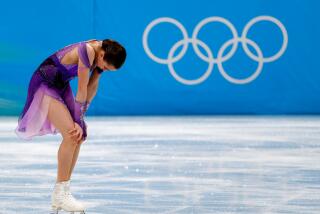TAC Rules Against Barnes : Track and field: Despite upholding shotputter’s suspension, panel criticizes drug-test procedures.
- Share via
A hearing panel of The Athletics Congress has upheld the drug suspension of shotput world record-holder Randy Barnes but criticized international drug procedures and said that track and field’s international rules place “an impossible burden” on athletes to prove their innocence.
Barnes, 24, was suspended by the International Amateur Athletic Federation, the world governing body for track and field, after testing positive for methyltestosterone, an anabolic steroid, at a meet in Malmo, Sweden, last Aug. 7.
The suspension prevents Barnes from competing for two years, barring him from the 1991 World Championships and the 1992 Olympics. He was a silver medalist at the 1988 Seoul Games and set his world record of 75 feet 10 1/4 inches in Los Angeles last summer.
John Dowd, Barnes’ attorney, said Wednesday he would appeal the decision.
In its opinion, the three-person TAC panel struggled with what it termed “conflicting concepts of fairness.”
The panel’s opinion noted: “Under United States standards, it is inconceivable that a sample to be used as evidence against an accused person would have gone through the process that Mr. Barnes’ sample(s) went through and still constitute reliable evidence.”
At the heart of the conflict was the IAAF requirement that Barnes prove his innocence, as opposed to a presumption of innocence.
“Were the burdens (of proof) to be reversed, TAC could not establish, by clear and convincing evidence, that the samples tested were in fact the same given by Mr. Barnes,” the opinion said.
Since TAC is an IAAF member and must adhere to IAAF rules, the TAC panel said it was “powerless” to rule otherwise.
“Because Mr. Barnes has presented no clear and convincing evidence that his sample(s) was (were), in fact, tampered with, we have no choice but to determine that he committed a doping offense . . . “
Nevertheless, Dowd and Barnes said they saw the decision as a vindication.
“I’m very optimistic,” Barnes said at a news conference. “I’m pleased at what the panel said. I feel we’re much closer now to getting the truth out.”
Barnes has denied he took any banned substances. He contends that his sample was either tampered with or that another sample, not his, was the one that tested positive. Since international testing protocol does not require that the samples be assigned a serial number and that the number be recorded on the paper work given the athlete, Barnes argued that the IAAF never established that the positive sample belonged to him.
The TAC panel, too, saw problems with the handling of Barnes’ sample, noting that a testing official stored Barnes’ sample in his own refrigerator overnight. This was one of three breaches of protocol that the TAC panel noted. The others were failing to record the sample’s number in Barnes’ presence and failure to provide a chain-of-custody for the sample. However, as the panel noted, the departures from IAAF guidelines were not relevant, since under the rules, “virtually anything the Swedish authorities did would have been permissible.”
Said one panel member: “He could have left it (the sample) out in the middle of the street.”
The panel--TAC Vice President Cliff Wiley, Penn Relays Director Tim Baker, and Brooklyn, N.Y., lawyer Jill Pilgrim--heard testimony on the case in a seven-hour hearing last month and largely supported Barnes’ version.
“We were dealing with two different concepts of jurisprudence,” Baker said. “It’s a totally different way of dealing with authority. We question authority, they don’t.”
Baker said the panel members struggled with their view of fairness and their duty to follow IAAF rules.
In fact, all three panelists have written a proposal to be presented to TAC’s Board of Directors calling for a change in the IAAF rules.
Barnes may appeal within TAC and, if he fails, to the U.S. Olympic Committee. Even if he wins his appeals, Barnes will be allowed to compete only domestically. Dowd said Barnes may appeal to the IAAF after exhausting his TAC appeals.
More to Read
Go beyond the scoreboard
Get the latest on L.A.'s teams in the daily Sports Report newsletter.
You may occasionally receive promotional content from the Los Angeles Times.









